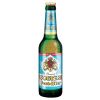Hofbrauhaus Wolters - Wolters Fest-Bier
-
ABV:
5.40% -
Serving Temperature:
45-50° F -
Suggested Glassware:
Mug or Stein

Wolters Fest-Bier pours a light coppery-amber color with a large, pillowy, head from an aggressive pour. On the nose, look for notes of lightly toasted bread, biscuits, mild Munich malts, and a touch of honey sweetness. Overlaying the malts are some herbal and grassy noble hop aromas, providing a very German character, along with a touch of fruit hinting toward apple flesh. On the palate, the beer comes across fairly round and medium bodied. Expect flavors of sweet bready malts, light caramel, hints of paper, a somewhat dusty and earthy lager yeast quality, and a very mild tart note in the finish. This is a perfect beer for a beer festival; some versions of the festbier style lean more toward what we would think of as a classic märzen, with a fuller-bodied caramel malt character and very strong bready notes, but Wolters brews their Fest-Bier a bit lighter with a somewhat more pronounced noble hop profile of grassy, herbal, spiciness that is emblematic of so many great German beers. The creamy, finely-carbonated, medium body of this brew is a delight, and kept us coming back for more. Enjoy with some brats or knockwurst and sauerkraut, or a hearty stew. Prost!

Unmatched Variety by style, brewery & country
Choose from Five different Beer Clubs offering unmatched variety by brewery,
country of origin, and beer style to suit your specific tastes.


